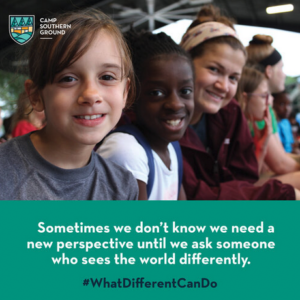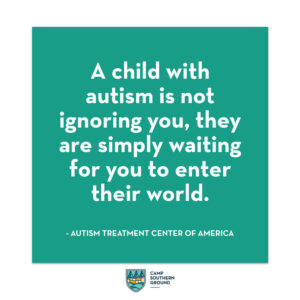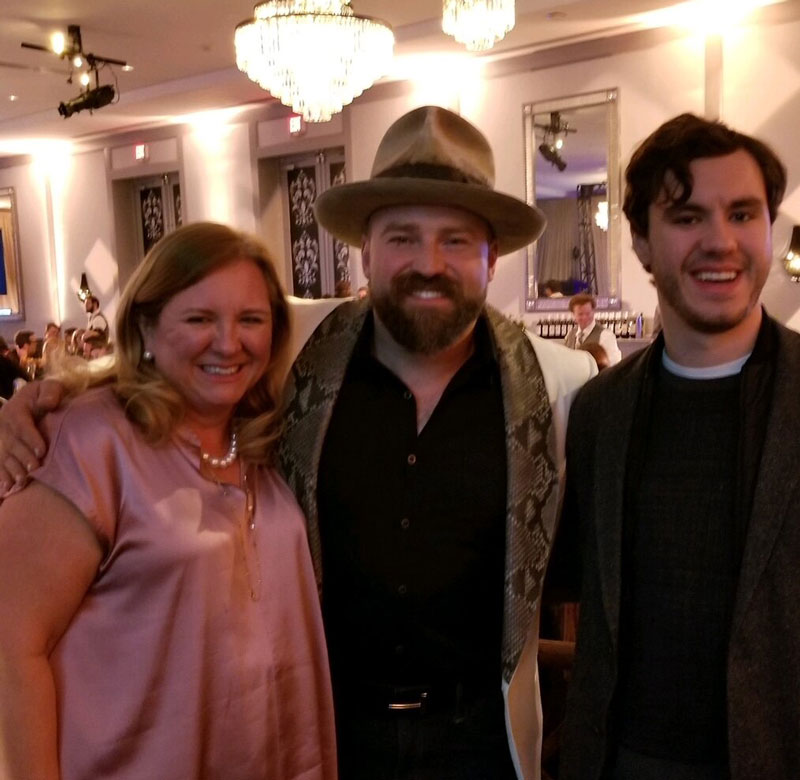What Different Can Do – Life on the Spectrum
For the month of April, we are sharing about What Different Can Do by talking to the real people who live in work in the world of neurodiversity, including differences like autism spectrum disorder, ADHD, and many others. As an inclusive summer camp we know just how amazing and talented these individuals can be, and how much better they make our camp community.

We want to show you why you should want them in your community! Let’s find out What Different Can Do.
To start off our conversations around neurodiversity, I spoke to Bridget Harrell, a mother, philanthropist, advocate, and board member here at Camp Southern Ground. We spoke about her young adult son, Carr, who was diagnosed as on the spectrum around age 4. Over a zoom call I was able to learn about the realities of living with a difference like being on the autism spectrum. Bridget shared about the challenges of having a young child on the spectrum, from diagnosis, to early intervention, and through the education system, Bridget has seen all sides of it from a mother’s perspective. I was also able to get to know Carr, an aspiring film maker who sounds a whole lot like most other young people trying to find their way in the world, though perhaps just a little bit differently.
“The things that make you autistic are the things that make you incredible” – Bridget Harrell
As Bridget and I spoke about Carr’s early years, one thing was very clear – we really have come a long way in understanding differences! Bridget talked to me about an early doctor’s appointment when a doctor assured her that her son did not have autism, even though his behaviors were already showing the truth. It took a few years for a final diagnosis somewhere around age 4, and Bridget is an advocate for the importance of early intervention. As Bridget has experienced, having an early understanding can help a parent prepare for some of the unique challenges that come from raising a child on the spectrum. Yet in spite of the challenges, Bridget glows as she speaks about her young son, the same as any other loving mother would.
As Bridget and I started talking about the things Carr has been able to do, we kept coming back to one accomplishment that really changed who Carr was and could be.
When I asked both Bridget and Carr about something he can do that they thought he would never be able to do, I got the same answer from both of them – driving. As Bridget talked about Carr’s driving she sounded like many parents of teens that I’ve known over the years, equally proud and terrified! One of the things that stood out the most to me was how Bridget beamed when she talked about Carr being able to schedule his own doctor’s appointments and drive himself there. That may seem simple, but to a mother of a child on the spectrum, that kind of independence is not always assured. Carr, for his part, laughed at how nervous he was about learning to drive. He said that once you figure it out, “It’s easy as pie!”
One thing that surprised me was learning that Carr has recently started tutoring a 13 year old family friend who is also on the spectrum. Bridget described the relationship as life changing for both of them, and I can tell that she truly meant it. Carr talked about helping his young friend to find ways to make his educational experience better by focusing on how to connect his subjects to the things that interest him.
When I asked Carr what he wants to say to young people living on the spectrum, his immediate answer was one I wasn’t expecting. Instead of starting, where my typical brain would start, by addressing the challenges they may experience from their differences, Carr showed me why understanding should always start with those who live it. Carr started by letting young people on the spectrum know that their friends really do care about them. He knows that worry because he’s lived it. We want those young people to know that he’s right, we really do care about you and love you for who you are.
Early Challenges and Worries
As Bridget and I spoke about Carr’s early years, one thing was very  clear – we really have come a long way in understanding differences! Bridget talked to me about an early doctor’s appointment when a doctor assured her that her son did not have autism, even though his behaviors were already showing the truth. It took a few years for a final diagnosis somewhere around age 4, and Bridget is an advocate for the importance of early intervention. As Bridget has experienced, having an early understanding can help a parent prepare for some of the unique challenges that come from raising a child on the spectrum. Yet in spite of the challenges, Bridget glows as she speaks about her young son, the same as any other loving mother would.
clear – we really have come a long way in understanding differences! Bridget talked to me about an early doctor’s appointment when a doctor assured her that her son did not have autism, even though his behaviors were already showing the truth. It took a few years for a final diagnosis somewhere around age 4, and Bridget is an advocate for the importance of early intervention. As Bridget has experienced, having an early understanding can help a parent prepare for some of the unique challenges that come from raising a child on the spectrum. Yet in spite of the challenges, Bridget glows as she speaks about her young son, the same as any other loving mother would.
As Bridget and I started talking about the things Carr has been able to do, we kept coming back to one accomplishment that really changed who Carr was and could be.
The Freedom of Driving
When I asked both Bridget and Carr about something he can do that they thought he would never be able to do, I got the same answer from both of them – driving. As Bridget talked about Carr’s driving she sounded like many parents of teens that I’ve known over the years, equally proud and terrified! One of the things that stood out the most to me was how Bridget beamed when she talked about Carr being able to schedule his own doctor’s appointments and drive himself there. That may seem simple, but to a mother of a child on the spectrum, that kind of independence is not always assured. Carr, for his part, laughed at how nervous he was about learning to drive. He said that once you figure it out, “It’s easy as pie!”
Helping Others on the Spectrum
One thing that surprised me was learning that Carr has recently started tutoring a 13 year old family friend who is also on the spectrum. Bridget described the relationship as life changing for both of them, and I can tell that she truly meant it. Carr talked about helping his young friend to find ways to make his educational experience better by focusing on how to connect his subjects to the things that interest him.
When I asked Carr what he wants to say to young people living on the spectrum, his immediate answer was one I wasn’t expecting. Instead of starting, where my typical brain would start, by addressing the challenges they may experience from their differences, Carr showed me why understanding should always start with those who live it. Carr started by letting young people on the spectrum know that their friends really do care about them. He knows that worry because he’s lived it. We want those young people to know that he’s right, we really do care about you and love you for who you are.

Bridget and Carr having a great time with Zac Brown, founder of CSG.
